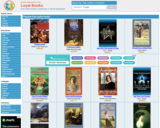
Loyal Books makes the world's public domain audiobooks available for browsing in a visual and entertaining way.
- Subject:
- English Language Arts
- Material Type:
- Activity/Lab
- Reading
- Date Added:
- 11/25/2018

Loyal Books makes the world's public domain audiobooks available for browsing in a visual and entertaining way.
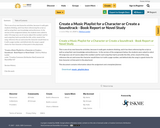
This is one of my new favourite activities, because it really gets students thinking, and it has them referencing the script as well as using their own knowledge and preferences. In the version of the assignment below, the students were asked to select 10 songs (you can of course adjust this number) and for each song they had to provide the title, artist, mood of the song, reference the act and scene the character would listen to it with a page number, and defend why the song is a good choice for that character at that point in the play/novel.

When students create digitally, that doesn't mean they can't interact face to face. The digital gallery walk blends digital and face-to-face learning.
Here's how it works:
1. Students create a digital artifact of their learning.
2. When everyone is finished, students display their work on their screens.
3. Students stand up and leave their devices on their desks.
4. They circulate the room, stopping at their peers’ desks (and devices) to check out their work.
(This could be applied to professional learning as well)
It's that simple. Check out this post for more details!

ESTIMATION 180 is a place for both students and teachers to enjoy making sense of math and develop their number sense together. Pick from over 200 visual estimation tasks that invite all your students to be part of rich math conversations and learning.
Each task begins with a question where student must analyze the evidence in the photo to answer the question. It provides lots of success for students who have different levels of thinking, and allows them to succeed even without getting the correct answer.

Give a 5 question mixed review quiz to students every Friday.The questions can focus on current learning, but should also include questions from the entire year (especially concepts needed for next week's lessons, or foundational items that need to be mastered). This strategy will help develop mastery, provide opportunities for mixed practice to ensure comprehension beyond specific learning content.

The new website for the Heritage Fairs (& High School Heritage Challenge) is now live and ready to accept project submissions for the Virtual Heritage Fair (grades 4-8) and the High School Heritage Challenge (grades 9-12)!
The Heritage Fair program provides the opportunity for students and their families, teachers and communities to learn about diverse Living Heritage projects.
There is still lots of time to prepare and submit a project to these contests, as the deadline is Monday, April 24. The online contests are open to all students in Saskatchewan.
Links to register and submit projects are on the homepage, as well as available in the dropdown menus for each respective contest.
Be sure to check out the Heritage Fairs toolkit that will give you topic inspiration, a list of popular research sources, and a detailed breakdown on how to create your presentation and share your findings. The toolkit is available in both English and French.
Le nouveau site web des Fêtes du patrimoine (et du Défi du patrimoine au secondaire) est maintenant en ligne et prêt à accepter les soumissions de projets pour la Fête du patrimoine virtuelle (niveaux 4 à 8) et le Défi du patrimoine au secondaire (niveaux 9 à 12) !
Le programme des Fêtes du patrimoine offre l'occasion aux élèves et à leurs familles, aux enseignants et aux communautés d'en apprendre davantage sur divers projets de patrimoine vivant.
Il reste encore beaucoup de temps pour préparer et soumettre un projet à ces concours, car la date limite est le lundi 24 avril. Les concours en ligne sont ouverts à tous les élèves en Saskatchewan.
Les liens pour s'inscrire et soumettre des projets se trouvent sur la page d'accueil, ainsi que dans les menus déroulants de chaque concours respectif.
Assurez-vous de consulter la trousse des Fêtes du patrimoine qui vous fournira de l'inspiration pour votre sujet, une liste de sources de recherche populaires et une description détaillée sur la création de votre présentation et le partage de vos résultats. La trousse est disponible en anglais et en français.

This package is the online accompaniment for our feature travelling education kit: History Box. In this package you’ll find digitized copies of each object found in the box, historical context, additional resources and activity suggestions. You do not need to borrow the kit to use this online resource.
This package contains objects and resources that are represented in the Canadian Museum of History’s signature exhibition, the Canadian History Hall. Collected from across the country, and highlighting varied perspectives, these objects illuminate the richness and diversity of the Canadian experience. They can be used as entry points to discussions on different periods in Canada’s history, or as lessons in historical inquiry that can build students’ critical thinking and historical inquiry skills.
To book a History Box, or for more information, please visit historymuseum.ca/learn/history-box.
The topics covered in this History Box include Early Canada, Colonial Canada, and Modern Canada.
There are two types of activities: Package Activities and Object Activities.
Package Activities are project-based activities designed to accommodate one or more classes. These activities involve the use of historical thinking concepts while exploring the whole package, resulting in a more comprehensive experience.
Object Activities are short inquiry-based activities that typically take 5–25 minutes. These activities encourage students to think critically about the objects being presented, and to use historical thinking concepts.
Both types of activities were created with the guidance of educators from across Canada, and incorporate current educational theory and approaches.
Is everything accessible?
We know that everyone accesses information differently, and have tried to ensure that package content addresses the varied needs of students and educators. Some of the many ways in which these packages support accessibility:
- Three levels of historical context to accommodate different ways of learning.
- A variety of media, including audio and video content, for diverse learning abilities.
- Multiple activity suggestions for diverse learning abilities.
- Content can be read with Assistive Technology applications.
- Downloadable and printable content that can be accessed offline.
- Transcripts for video, audio and hard-to read archival documents.
- Video subtitles in both official languages.
- Content is available in both official languages.
- Website complies with Website Content Accessibility 2.0 AA Guidelines.

This lesson provides everything you need (from the inspiration, anchor, lesson, templates, examples) to create meaningful and beautiful poems for mothers, fathers, teachers or anyone meaningful in your students' life!
Younger students - could do this together as a class or in groups.
Elementary and middle years - could write an example together, then write their own
Older students - could write these independently and pick a more complex comparison

"The Move Think Learn Series supports physical activity leaders and teachers working with children and youth in Kindergarten to Grades 9 develop their physical literacy – knowledge, confidence, and competence – through unique, inclusive, and fun activities.
Using a Teaching Games for Understanding (TGfU) approach, children work through tactical gameplay problems, think through options and skills, and learn how to apply this learning to broader gameplay situations."
Register for a free account to access this resource.
Unit plans included are:
1. Archery in Focus (4-6)
2. Badminton in Focus (4-6)
3. Basketball in Focus (4-6)
4. Basketball in Focus (7-9)
5. Canoe/Kayak in Focus (4-6)
6. Cricket in Focus (7-9)
7. Curling in Focus (4-6)
8. Cycling in Focus (4-6)
9. Football in Focus (K-3)
10. Football in Focus (4-6)
11. Football in Focus (7-9)
12. Team Handball (4-6)
13. Hockey in Focus (7-9)
14. Ringette in Focus (4-6)
15. Soccer in Focus (4-6)
16. Soccer in Focus (7-9)
17. Softball in Focus (4-6)
18. Squash in Focus (4-6)
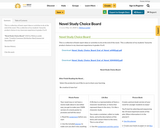
This is a collection of book report ideas or activities to do at the end of the novel. This a collection of my students' favourite product choices in my classroom experience in grades 4 to 8.

Attention Saskatchewan high school science teachers!
Looking for some FREE resources and opportunities that will connect the curriculum with real-world applications as it pertains to: health and wellness; medicine, nursing, & biomedical engineering?
Check out these 3 resources for science teachers to use to help reach students who might be interested in healthcare careers (these are available gratis):
1. Science teacher hub that gives teachers access to 50+ resources that they can use in the classroom (medical mystery cases, mentorship videos, what different medical specialists do etc..) (https://www.premedskl.com/teacherhub/)
2. Quarterly Medical Bs for high school students - which are case-based competitions (think Jeopardy meets WebMD!). (https://www.premedskl.com/medicalb/)
3. IDEA Scholarships to PreMedSKL, a 1-year advanced curriculum and mentorship program for high school students interested in exploring a career in medicine and healthcare. The IDEA Scholarship is for students from communities that are traditionally under-represented in medicine (ie Indigenous, Black, LatinX and other communities). (https://www.premedskl.com/idea-scholarship/)

From The University of Waterloo:
"Many instructors in engineering, math and science have students solve “problems”. But are their students solving true problems or mere exercises? The former stresses critical thinking and decision-making skills whereas the latter requires only the application of previously learned procedures. True problem solving is the process of applying a method – not known in advance – to a problem that is subject to a specific set of conditions and that the problem solver has not seen before, in order to obtain a satisfactory solution."
Details are provided on the principles of problem-solving as well as each step of the process outlined below:
Define the Problem
Think About it
Plan a Solution
Carry Out the Plan
Look Back
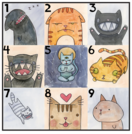
These check ins are a quick way to get your finger on the pulse of your classroom and respond accordingly!
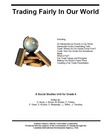
An excellent resource from the Eastern Ontario Catholic Curriculum Cooperative. This resource includes an in-depth simulation to place students into the “shoes” of those living in poverty. “This unit will help engage students to actively explore international trade, development and co-operation issues as they pertain to Canada, its trading partners, and the fair trade system.”
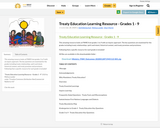
This amazing resource looks at FNME from grades 1 to 9 with an inquiry approach. The key questions are examined for the grades including treaty relationships, spirit and intent, historical context, and treaty promises and provisions.
Following that a specific resource for each grade is included!
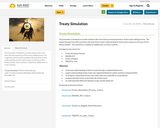
This simulation is designed to provide students with a first hand, personal experience of the treaty making process. The insight they gain from this simulation will assist them in their understanding of treaty and its impact on the lives of First Nation peoples. This simulation is targeted at middle years to senior students.
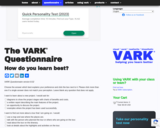
Do you know how you learn? Take this quiz to determine your learning style.
Visit the "about" tab for videos and more information about VARK.
Take the actual inventory under the "questionnaire" tab. Note that there are different versions for young people and teachers available.
Last but not least, go to the "using VARK" tab to learn how to integrate VARK into your teaching or learning practice. There are also role playing scenarios available.
**Make sure you explore the strategies listed that apply to you under the "questionnaire" tab after you complete teh inventory. It provides information that will help you learn better.**

Word Connections is a supplemental reading intervention program.
It includes 40 lessons (40 min each), divided into four units of instruction.
Developed for students in third grade and above who continue to experience challenges with word reading even though they have developed foundational decoding skills.
The lessons focus on promoting automaticity with reading “big words.”